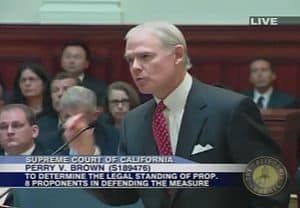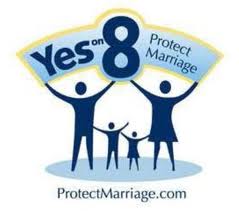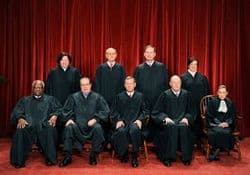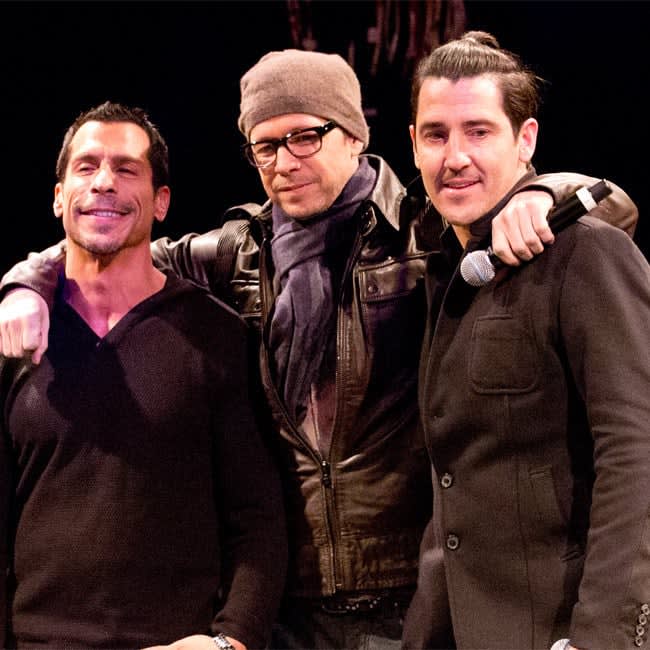This is the second in a series of analyses about the Supreme Court's decision to hear cases challenging the constitutionality of the Defense of Marriage Act and Proposition 8. Today's discussion: Standing.
 Standing is like an admission rule at a bar. Before you can even get through the door, you have to fulfill certain basic requirements, like being over 21, appropriately attired, and not already drunk and disorderly. And, in determining whether you meet the requirements, the bouncer looks at evidence: your driver's license, your general demeanor, and your clothes.
Standing is like an admission rule at a bar. Before you can even get through the door, you have to fulfill certain basic requirements, like being over 21, appropriately attired, and not already drunk and disorderly. And, in determining whether you meet the requirements, the bouncer looks at evidence: your driver's license, your general demeanor, and your clothes.
Courts have similar rules. In order to even have the chance to get your voice heard, you have to meet a host of requirements: your attorney has to be admitted to the bar (though there are times you can litigate by yourself), you had to have handed in your briefs or motions on time, and you have to be the right person to raise the legal issues. That's what we call standing. Normally, standing isn't such a big deal: if you hired me to fix your roof and I just decided not to, you're clearly the aggrieved or damaged party, so you can sue me for breach of contract.
Standing requirements ensure that courts only spend time on cases where there are actual controversies or conflicts between the parties just like ID requirements at bars ensure that alcohol gets served only to those 21 and over. So, it should come as no surprise that the Supreme Court is interested in whether Windsor v. United States, the Defense of Marriage Act (DOMA) case, and Hollingsworth v. Perry, the Prop 8 case, have been brought by the right people.
Many of us should be familiar with the standing discussion in the Prop 8 case; we've talked about it extensively here, here, and here. We haven't talked much about standing in the Windsor case, but it bears some resemblance.
Let's consider these questions in more detail AFTER THE JUMP and discuss what might be behind the Supreme Court's decision to grant review of the standing questions.
CONTINUED, AFTER THE JUMP…
What is standing?
To say that standing is a preliminary get-through-the-door requirement does not minimize its importance: standing is a constitutional question based on Article III of the Constitution that limits federal courts to only hearing live cases and controversies. A "live" controversy is a real case, a specific disagreement between two parties than can be resolved by a court deciding between them. Therefore, both parties have to be the correct parties before the court to resolve the dispute.
In the federal courts, having standing usually means that you are directly affected, impacted, or injured by the underlying event. Take the roofing example: If you hire me to fix your roof and I refuse to, you are clearly the injured party. When I lose at trial, I'm adversely affected by an adverse decision, so I appeal. And, so on. But, that doesn't necessarily mean that the only question is whether the Prop 8 proponents and House Republicans were directly harmed by some adverse lower court decisions. The question may also be whether these secondary parties are the right groups to step into the shoes of the actual injured party, i.e., the state — California and the federal government, respectively.
PROP 8, Hollingsworth v. Perry: 
The question: Can initiative proponents step into the shoes of the state to defend the law they wrote?
The Supreme Court wants the parties in the Prop 8 case to brief this question again, even though the Ninth Circuit addressed it before. The Ninth Circuit said that it is clear that the State of California was affected by Judge Vaughn Walker's initial decision declaring Prop 8 unconstitutional: the state had to start issuing marriage licenses to gay couples. But, when the state welcomed the change and refused to challenge the order, the group that wrote Prop 8 stepped into the state's shoes. The Ninth Circuit then needed state authorization to allow that to happen, authorization that it eventually got from a favorable California Supreme Court decision.
Notice that proponents' standing didn't depend on them being directly injured or harmed by the ruling, or that somehow their lives were made worse by California allowing gays to marry. Standing to appeal depended on California being injured or affected and a state law that allowed initiative proponents to take up the mantle of the state's standing.
That makes some theoretical sense, but it appears to contradict a 1997 Supreme Court decision in Arizonans for Official English v. Arizona, where the Court expressed "grave doubts" that initiative proponents could ever have the right to pursue an appeal to defend their initiative when the state refuses to. The Court said that proponents had to show some "direct stake" in the controversy.
The stakes: What could happen if the Supreme Court finds no standing?
If the Court finds no standing to appeal, then there never was standing to appeal; ProtectMarriage could never have taken the case to the Ninth Circuit. So, the Ninth Circuit's decision would be wiped out, as if it never existed. On the one hand, that would deprive us of some important analysis, some favorable conclusions of law, and some helpful persuasive precedent at the appellate level. On the other hand, it would reinstate the broader district court decision that declared unconstitutional all bans on the freedom to marry. Notably, there has been some question as to whether even that case applies to more than just the few plaintiffs in the case; but, that's more of a hiccup than a barrier and not worth a discussion at this time. Suffice to say, if the original Perry only applied to two couples in two California counties, the plaintiffs could seek to extend the ruling to the entire state via the state courts
DOMA, Windsor v. United States:
The question: Can the House Republican majority appeal a lower Court decision where the Administration won?
The Obama Administration won at the Second Circuit and winners generally can't appeal, so if the House Republicans are not properly part of the case, there is no adverse party — or, loser — to appeal the Windsor case to the Supreme Court. So, House Republican standing is essential for continuing the Windsor case at the Supreme Court.
The duly elected leadership of part of the legislative branch of Congress is different than a random collection of individuals who helped write and propose a state ballot initiative. But that doesn't mean that the House can willy nilly step into any case it wants without authorization. There ostensibly still needs to be some direct injury and some statutory or traditional rule that allows the legislative leadership to step in where the Executive Branch normally would be.
The stakes: What could happen if the Supreme Court finds no standing?
Winners can't appeal, so if the House Republicans are not properly in the shoes of the Obama Administration, there is no defender of the law, the case is over and the Second Circuit decision stands. That would most likely solve Ms. Windsor's $350,000 discriminatory tax problem, but it would mean that DOMA is the law in some parts of the country but not others.
Most of the speculation about the Supreme Court's decision to consider standing in both the Prop 8 and DOMA cases centers around the idea of an "out," an easy escape clause in case the Justices do not feel the Court is ready to make a statement on the underlying substantive matter. That's entirely possible. The Justices of the Supreme Court have long tried to make as narrow rulings as possible, both as a matter of strategy and as part of a tradition of judicial humility: only decide as much as necessary to decide the case before you, and no more.
The strategy could work for both sides of the political divide. If the more liberal Justices think that they can't get a fifth vote, they would rather short circuit the case through the standing issue than risk a substantive decision that sets gay rights back a generation. If the more conservative Justices feel Justice Kennedy is jumping ship, they may try to cut off progress before it starts. Standing provides a convenient short cut that could preserve a positive lower court decision and yet keep the meddling, highly politically-charged Supreme Court out of the controversy.
But standing is not some tool of a avoidance. Making a bad standing ruling just to avoid having to decide a controversial issue is not behavior we have come to expect from the Supreme Court of the United States. The Court might very well have substantive concerns about the standing issues. After all, the Ninth Circuit's standing ruling appears to contradict the spirit, and perhaps the letter, of Arizonans. And, there has hardly been an extensive substantive briefing of the right of the House Republicans to step into the shoes of the Obama Administration. The motion practice below may not have been cursory, but it was decided in just a few sentences.
Under the principles of Arizonans, ProtectMarriage never had standing. But, under the principles of Karcher v. May, a similar case involving state legislative leadership taking the place of a state executive branch, and other cases involving the federal government, House Republicans likely have standing to pursue the Windsor appeal. Any other decision, especially in Windsor, would lead to absurd results.
***
Ari Ezra Waldman teaches at Brooklyn Law School and is concurrently getting his PhD at Columbia University in New York City. He is a 2002 graduate of Harvard College and a 2005 graduate of Harvard Law School. His research focuses on technology, privacy, speech, and gay rights. Ari will be writing weekly posts on law and various LGBT issues.




